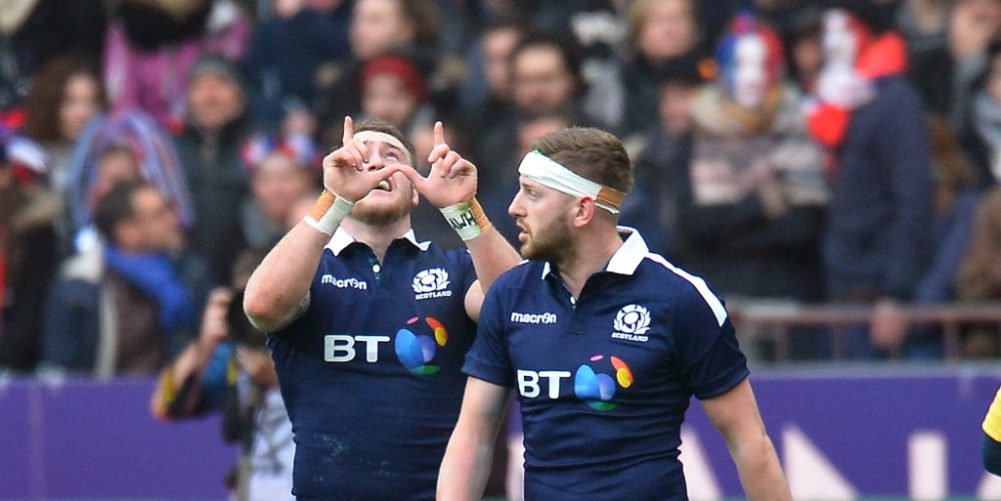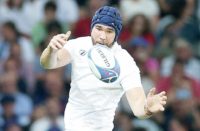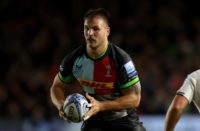STUART Hogg has always been different. The Exeter Chiefs and Scotland full-back has been hailed as one of Rugby Union's free-spirited runaway talents since he burst onto the international scene eight seasons ago.
So, when Hogg makes a ‘W' sign after scoring tries for the Chiefs or Scotland, as he has for every team he has represented in his rugby career since 2009, it could easily be mistaken for a maverick idiosyncrasy.
However, it has a much deeper meaning. The ‘W' is in memory of Richard Wilkinson, his boyhood friend and Hawick Wanderers team-mate, who was killed at 17 in a car crash both were involved in returning from a Sevens tournament in Kelso, which later saw two teenage male drivers jailed for four and a half years.
Having accepted a lift back to their home town of Hawick the two mates played a game of rock-paper-scissors for the front passenger seat, which Richard won, with Stuart taking the back seat. The savage twist of fate was that the car in which they were passengers became involved in a two-car road race, and at 90 mph their vehicle left the road and overturned.
Hogg managed to break the rear window to get out of the car, but his friend was not so fortunate. He says that Richard Wilkinson, whose initials he also has tattooed on his ribs, remains a main motivating force in his career.
“I still make the sign. I do it after every single try. He could quite easily have been in my shoes in terms of being a professional rugby player. He was a great boy, a great bloke, and I want to make him and his family proud and take him along the journey that I'm living.”
It is why Hogg's sense of purpose is ever-present, and on a number of occasions during the interview he refers to the importance of making a difference to the teams he plays for, whether club or country.
It also informs us why he not only left Glasgow Warriors after nine years to make a new start with Exeter this season, but also asked Scotland coach Gregor Townsend to make him national captain in the wake of a disappointing 2019 World Cup campaign.
Hogg says: “When we came back from the World Cup in Japan I'd been involved in the leadership group for a long time, and I asked Gregor his thoughts moving forward, and said I'd very much like to lead Scotland. We had a few tough conversations about it – but it was great to be given the opportunity.”
Finding a player in the pro game with the self-belief to ask for the captaincy is like re-discovering a species that everyone thought extinct – but no sooner had Hogg been granted his wish, than he was in the firing line.
The first incident was friendly fire, because when he arrived at Exeter the week after returning from the World Cup, still sore from Scotland's pool defeat by Japan, he found his locker at Sandy Park festooned with Japanese flags.
“I didn't quite know what to expect, but the boys welcomed me with open arms – and the flags. I didn't want to come across as bitter and huffy, so I left them up there for a couple of weeks. One day I went in and said, ‘when are these coming down', and the next thing they were down. So, I saw the funny side of it, and was pleased the boys were obviously thinking of me!”
However, Hogg felt instantly at home. He says he moved to Devon because he wanted to challenge himself at a club which has proved its quality and has shown its desire to win silverware, and he has not been disappointed.
His testimony suggests that the Chiefs are not 14 points clear at the top of the Premiership table after their resounding 59-7 win over Worcester last Sunday, or chasing their first European Cup title with a home quarter-final against Northampton in three weeks' time, by default.
“The standards at Exeter are phenomenal. The good thing is that the schedule very rarely changes. Everybody works incredibly hard for each other and every single game you empty yourself. You give everything.”
Ask Hogg, 28, about his highlights so far, and he states that joining Rob Baxter's Exeter has given him a new enthusiasm, as well as providing him with a buffer-zone against the constant brickbats he says is part of playing for Scotland.
“Collectively I just love the way we play. We play with high-energy, we back our structure, we back our fitness and our talent, and we get to go out there and express ourselves.
“As an individual, if I'm playing with a smile on my face, that's when you see the best of me. Slowly but surely I was starting to find my feet before the Six Nations. It's the first time I've had to move club, so I thought when I came down here I had to justify myself, and made a lot of mistakes because I was almost trying too hard. Then I went and played for Scotland, and made a couple of errors that I was being reminded of on a daily basis.”
The errors in question, when Hogg dropped the ball after crossing the Irish line in Dublin in his new role as captain, and not snaring a grubber before Ellis Genge's try clinched victory for England at storm-hit Murrayfield, led to him being pilloried by keyboard warriors.
It resulted in Hogg's exit from social media, and he explains that he has withdrawn because of the way trolls poison the communications platform for everyone.
“I love that they thought I dropped the ball because I was captain. If I wasn't captain I would probably still have dropped the ball! It was the same against England, when I didn't catch the bouncing ball in the worst conditions I've ever played in, and they scored just afterwards.
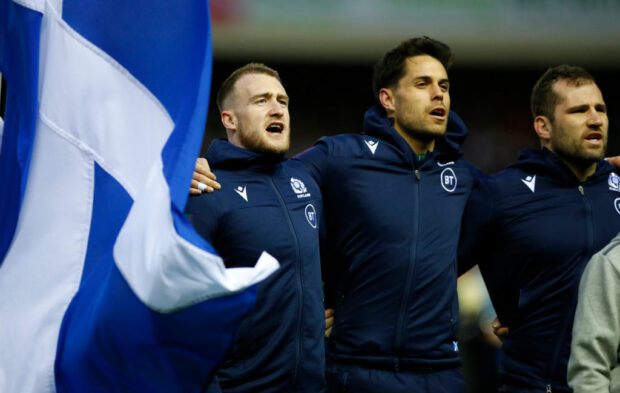
“The big thing with social media is the opportunity to engage with the fans, to give some time back to people who care about you. But although nine in ten want to do that, there is always one which is just about abuse, and when you look at their page that is all they do. If that's what they want to do with their lives, then good luck – but they ruin it for others, and I can't be bothered with it.”
Hogg says that a return to play for the Chiefs during the Six Nations break after those narrow losses was instrumental in getting him back on track. He takes up the story:
“We went to Gloucester, and I was getting a fair amount of crap from their fans behind the posts when I managed to score a very good try. And that was me in a nutshell – being able to beat players, to help distribute, to back-up and get a second touch, and then finish off and have a bit of fun diving over and celebrating.
“I said to my wife, Gill, that night that I would score another try like that very soon – and when I scored again against Italy the week after in our 17-0 win in Rome I felt, ‘that's the turning point'. Let's relax, do my normal job, and not try too hard.”
It worked a treat when Hogg led Scotland to a 28-17 home victory over France in March, ending their Grand Slam hopes and putting the Scots in third place. He says the Covid lockdown's postponement of the tournament gave him more time to take stock and face the restart with a clear mindset.
“I did a lot of reflection and thought I'm not going to beat myself up about little mistakes, because mistakes happen, and perfection, for me, does not exist. So, you bounce through mistakes, and I've scored from a couple of well-worked team tries for the Chiefs recently, and from almost putting too much pressure on myself, I've felt now is the time to enjoy it, because you don't know when your last game's going to be.”
It is an inevitable thought that much of the pressure Hogg feels stems from his reputation as a match-winner, and expectations that he is capable of conjuring tries from thin air.
It has stretched from his formative rugby days in Hawick – where his father, John, played at full-back for the club before becoming a referee – to the attacking brilliance that earned him back-to-back Six Nations Player of the Championship awards in 2016 and 2017, as well as inclusion in the 2013 and 2017 Lions tour squads.
Hogg's flair and ability to torment defences has invited comparisons with George Best, with whom he shares a common bloodline through his father's family.
So, does he draw inspiration from the connection with the Manchester United footballing genius? “Absolutely. It's all from dad's side of the family (in Ireland), and it's pretty cool. We call them the ‘Bunch of Dafties', and they're outstanding. Whenever George Best is mentioned people's eyes light up. He was an incredibly talented football player. So, yep, he's a very, very distant relative – but we'll take it.”
The flip-side of the coin is that Hogg's defensive abilities have not earned the same plaudits. This was highlighted when Exeter faced Glasgow in the European Cup with Warriors assistant coach, Kenny Murray, suggesting their former full-back's defence “maybe isn't quite as strong” as it should be.
Hogg's response has a sting in the tail: “I believe you are never the complete player, that you've always got areas to work on, and that defence probably isn't my strongest point. But I play in a team that fronts-up defensively, and I'll make my tackles when I can. I'll not make every single tackle, because sometimes that's not possible, but when Exeter went to Glasgow we scored 30 points against them, so, yeah, I don't think it's my defence that's the problem there.”
The Scottish captain gives similarly short shrift to the national team's critics. “I'm passionate about making a difference, and very passionate about playing for Scotland. I got sick of all the crap that came our way about scoring tries, but conceding even more tries, and all the negative stuff that came with it.
“I remember sitting in the Press conference after we'd beaten Italy in February, and the first question was should I not have put Sean Maitland in for a try? I said, why are you concentrating on the negatives when we have just scored three tries to nil? Obviously, we can get better, but why look at the negatives when we had just won a Test match?”
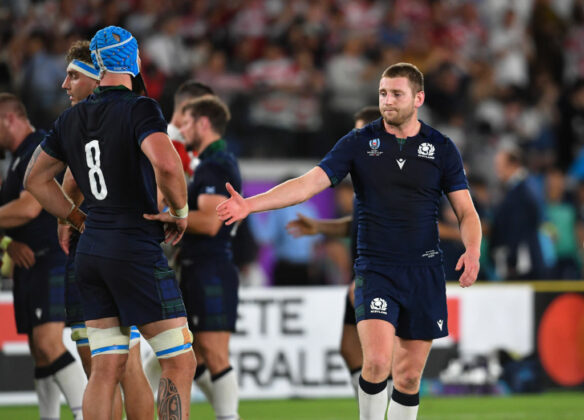
Hogg adds that there is a big positive for Scotland ahead of their delayed last round Six Nations match against Wales in Cardiff at the end of October, with fly-half Finn Russell poised to return after healing his rift with Townsend.
“One hundred per cent Finn will play. He's far too good a talent and leader not to be involved. I truly believe that Gregor and Finn will be back to normal, and we will be able to crack on and forget about it. The good thing for us about Finn being out, is it gave Adam Hastings the chance to show what he's about, and show the strength of Scottish rugby.”
That growing strength is also epitomised by Hogg, who deflects a question about how much being part of the 2021 Lions tour to South Africa means to him, having missed out on playing a Test in 2013 and 2017 – the last time due to a broken cheekbone.
He says: “I'm just concentrating on doing my job for Exeter and Scotland, and as I said ahead of the 2013 tour ‘if it's for me, it won't go past me'. So, it won't be through lack of trying, I can assure you.”
Stuart Hogg is different, and he is making a difference, both for Exeter and Scotland. He will want to do the same for the Lions, and mark it by making the sign of the ‘W'.

